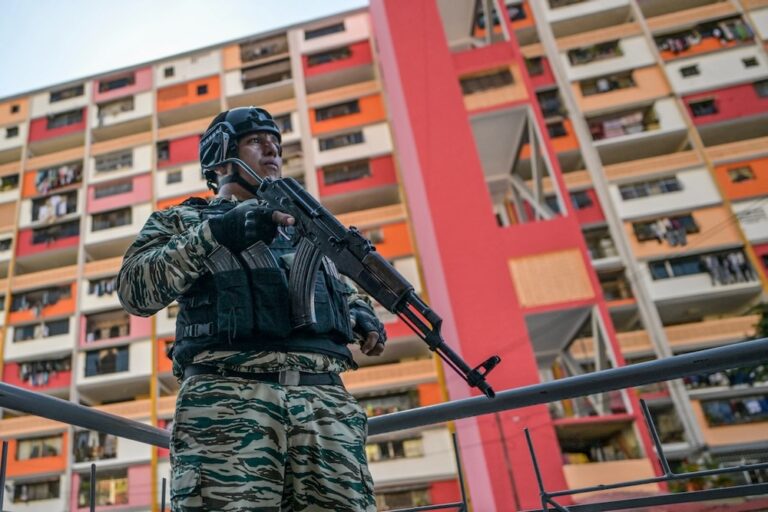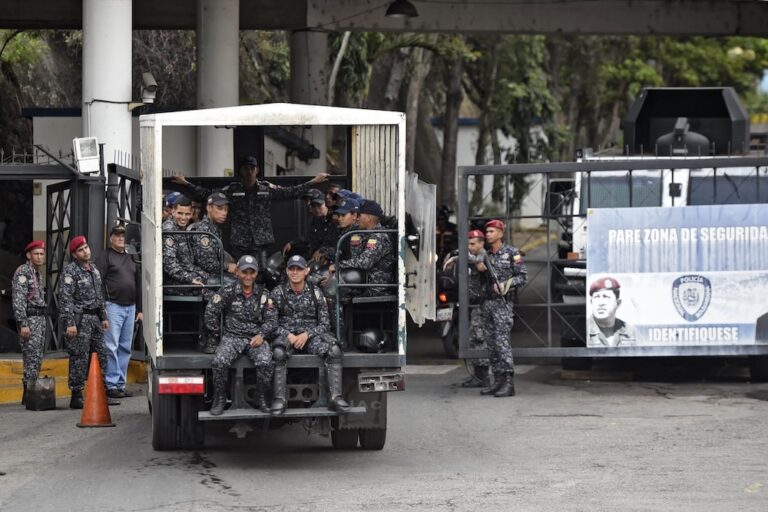With seven months to go to an October presidential election in which incumbent Hugo Chávez will face a challenge from opposition leader Henrique Capriles, the media are already experiencing a level of tension and confrontation that is well beyond what is normal in a pluralistic democratic debate.
(RSF/IFEX) – With seven months to go to an October presidential election in which incumbent Hugo Chávez will face a challenge from opposition leader Henrique Capriles, the media are already experiencing a level of tension and confrontation that is well beyond what is normal in a pluralistic democratic debate.
Expressions of hate, insults, rumour-mongering and sometimes violence against journalists “guilty” of belonging to a particular news media have reached alarming proportions. Not all the attacks are directly linked to the election, but the tension created by the rivalry between the main political camps is making it harder and harder for journalists to operate in the field.
“The responsibility for this situation is clearly to be found at various levels,” Reporters Without Borders said. “It involves the government and the main political parties, which must urgently remind their members of the basic principles of political debate instead of systematically accusing the other camp.
“It also involves the media, all of which – both state and privately-owned – should pledge to give both candidates a fair share of space or airtime and refrain from the kind of exaggeration and distortion that exposes their own employees to anger on the streets. Might it be possible to get the political leadership in both camps and the various media to agree on a code of conduct?
“Finally, Reporters Without Borders calls for an end to hostilities in the blogosphere. We unreservedly condemn both the morbid and degrading speculation about President Chávez’s medical condition and the homophobic and anti-Semitic comments about Henrique Capriles. Such discourse, repeated on Twitter accounts that are often hacked, is unworthy of the important political decision the nation faces.”
Various incidents during the first half of March have highlighted a climate of political polarization that could pose a danger for journalists. During a visit by Capriles to the Caracas neighbourhood of San José de Cotiza on 4 March 2012, armed members of the ruling United Socialist Party of Venezuela (PSUV) threatened a crew from the TV news station Globovisión consisting of reporter Sasha Ackerman, cameraman Frank Fernández and assistant Esteban Navas.
Shots were fired and an opposition parliamentarian’s son sustained a bullet wound. The TV journalists were chased as they ran to take cover in a house, and had to surrender their recordings to their pursuers.
Loathed by the government, which cannot forgive it for the sympathy it showed for an abortive coup attempt in April 2002, Globovisión is still facing a heavy administrative fine for its coverage of riots at El Rodeo prison, near Caracas, in June 2011.
Members of the La Piedrita Collective, a radical pro-government group based in a working-class district of the capital, staged a demonstration outside Globovisión’s headquarters on 11 March, accusing it of “financing paramilitary groups” and being responsible for the murders of two La Piedrita activists the day before. Fortunately, the protest did not lead to any violence.
Four days later, members of a local council attacked a TV crew working for the programme “El Radar de los Barrios” during an attempt to interview residents of a locality in Carabobo state about industrial pollution of water supplies.
Under an order issued by a Caracas court on 21 March, all print, broadcast and online media are now banned from referring to the alleged case of industrial pollution of water supplies in the Caracas metropolitan region and in the neighbouring central states of Miranda, Aragua and Carabobo.
The ban was issued at the request of three citizens with the aim of verifying whether the media “campaign” about the alleged pollution constitutes an offence requiring a criminal investigation. According to attorney-general Luisa Ortega, no serious evidence has been produced to support the claims.
“This is just politically-motivated censorship,” Reporters Without Borders said. “When the authorities are unnerved by a story like this, they tend to brand it as an attempt to ‘destabilize’ public order. Is the public so incapable of forming its own opinion? Does a subject of general interest have to be suppressed because it could cause a ‘panic’? This court order is both dubious and inopportune and will just help to worsen the pre-election political and media climate.”
(…)


